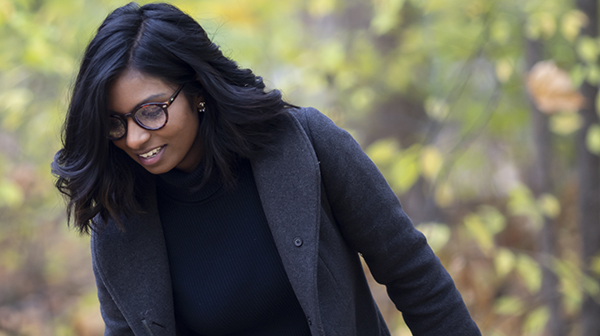
When University of Guelph-Humber Early Childhood Studies Resource Centre Community Events Coordinator and alumna Aren Sammy did her third-year practicum at Sick Kids, her colleagues told her how difficult it was to explain to the children at the hospital that their friends had passed away. For Sammy, those conversations sparked a passion for therapeutic literature, and created a domino effect that led her to pursue an untraditional path in the early childhood studies field.

While at Sick Kids, she was inspired to write a children’s book called “My Hardest Goodbye,” which she wrote with a classmate for her Children with Diverse Needs and Families class. The book told the story of a young boy who had lost his beloved dog. It shows the stages of grief in a child, includes a guidebook for parents and early childhood professionals, and demonstrates eco-therapy (at the end of the book the family plants seed paper in memory of their dog). “When I was talking to volunteers and mentors at Sick Kids, they said it was hard because kids would be wondering where their friends were in the playroom, so that’s where I had the idea to write the book – even if you don’t feel comfortable having that conversation with a child, you can feel comfortable reading a book,” she says. “You can take what you like from the story and facilitate a conversation with it.”
“It was my time at Sick Kids that really inspired me to do that book – we put our heart and soul into it, and it turned out amazing,” Sammy continues. “The response to the book was just incredible - I was fascinated by how interesting literature therapy can be, and my interest in therapeutic literature cascaded from there.”
A new perspective on ECS
After completing her third year at UofGH, Sammy spent her summer applying to children’s publishers for her fourth-year practicum, determined to learn everything she could about the publishing industry so she could find out how to publish the book in the future. She eventually landed at Scholastic Canada, where she worked in their Marketing department. “It was incredible, looking behind the scenes at Scholastic, and learning the protocols for writing drafts and getting publishing approved, marketing towards professionals working with children, and seeing what’s available in their stock – it was such an eye-opening experience for me,” she says.
Sammy says that although her practicum at Scholastic wasn’t traditional, she was able to use the skills she developed in the ECS program to look at early childhood studies from a different angle. As the first ECS student at Scholastic, she used her knowledge on child development to review the books, help recommend age groups, and flag any content that was not developmentally appropriate for the targeted age groups. She also implemented Scholastic’s Pinterest site. “The information I got from the ECS program really helped because I was able to distinguish the books, and understand where these categories would fit with what grades and developmental levels. I learned a whole other perspective of education in our field. It put me in a different scope of what I was learning in ECS – as an early childhood professional you’re directly with the child and you can assess their developmental needs, but now I’m looking at resources for early childhood professionals to implement to assess learning, so now I’m thinking more abstractly.”
A career path in the books
Writing the book, and her Scholastic field practicum, expanded Sammy’s love of therapeutic literature that had begun at Sick Kids, and helped her decide on a career focus. She is now pursuing a Master’s degree in Early Childhood Studies at Ryerson University, where she hopes to focus her research on the effects of children’s literature on hospitalized children, and develop therapies for child life specialists to implement.
“When I got into the publishing world I loved it – it definitely influenced where I wanted to go with my research, and it helped me narrow it down,” she explains. “I really enjoyed the therapeutic side of literature, and didn’t see a lot of it in their variety of books, so that pushed me even more.”
“Therapeutic literature is great because it allows the child to recognize, feel, and talk about their emotions,” she adds. “Sometimes when you have a conversation with a child they won’t respond, but when they have this story, and this character that’s going through the same or a similar thing, or the environment has similarities, they start to connect – and it allows the child to feel they’re not alone, that their feelings are valid, and they can express themselves and their emotions.”
Sammy is also loving her job as the Early Childhood Studies Resource Centre Community Events Coordinator at UofGH. “I genuinely love my job, and I learn so much in my position every day,” she says. “Nikki Martyn and Elena Merenda are amazing leaders – they really care about your path, and it’s been wonderful.”
After she completes her Master’s, she hopes to eventually pursue a PhD, and although there are no imminent plans she hopes to publish her book in the future. “I went to Scholastic to see what that industry is about, and we really would like to publish the book – I just have not had a chance to sink into it, but it’s something that I’m very interested in doing,” she says. “I’m very happy I explored that avenue, and it’s still impacting what I do now, because when I do research in my Master’s, therapeutic literature is a huge part of what I’m interested in.”
Learn More About







